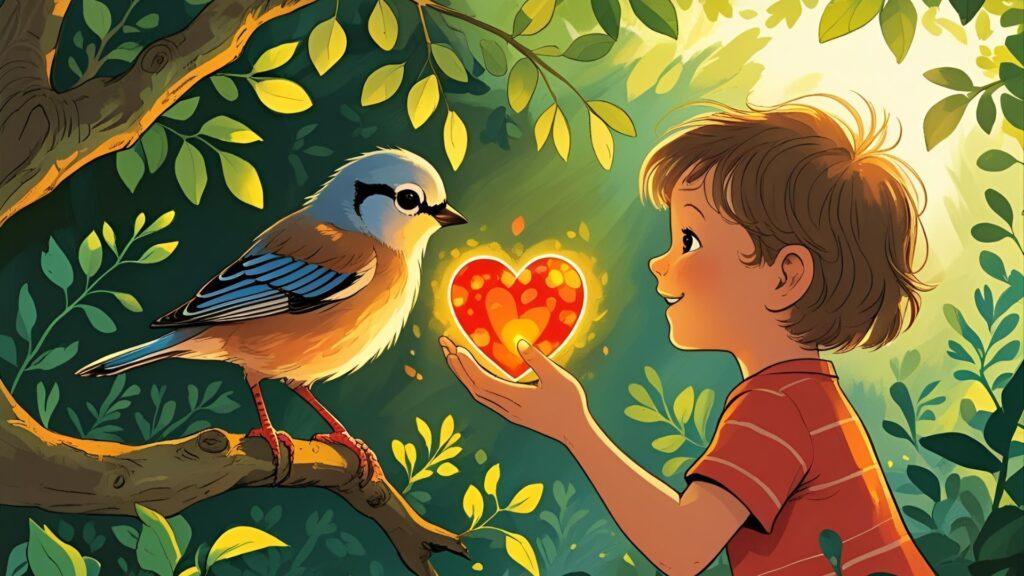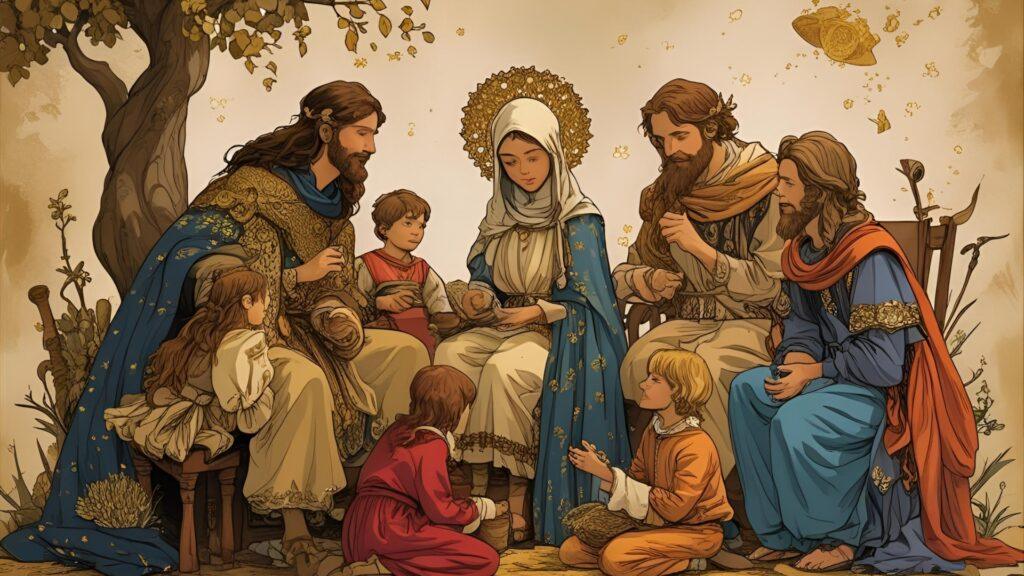Ever read a story so short it only takes a few seconds—but you keep thinking about it for hours?
“A child plants a seed in her grandmother’s garden. The next morning, she finds a full-grown tree with fruit she’s never seen before.”
That’s just two sentences. But it makes you pause. What kind of fruit? How did it grow overnight? Was it real or a dream? Is it about magic—or memories?
That’s what micro-stories do. They’re short, but they say a lot. Sometimes more than long stories ever could. They make us feel something, think differently, or see life in a new way—all in just a few lines.
In this article, we’ll look at six little stories with lots of meanings—each just a few sentences long. We’ll break down what they’re really saying, how they work, and what we can learn from them.
You’ll see:
- What each story is about
- How small details or objects carry big meaning
- Why these tiny stories can be powerful and emotional
This article is for anyone who enjoys stories—teachers, writers, or anyone who just likes thinking about life a little more deeply. You’ll also find some helpful tips for using these stories in class, in conversations, or even for your own growth.
Here are the six stories we’ll talk about:
- The Sparrow’s Gift
- The Broken Lantern
- The Paper Boat
- The Silent Rose
- The Lost Key
- The Golden Thread
For each one, we’ll go over:
- What happens in the story
- What it might really mean
- The feelings it brings up
- The main message or lesson
- A moment that changes everything
- How it connects to real life
- A few simple questions to think about or talk through with others
You don’t need any special knowledge—just curiosity and an open mind.
Six Little Stories With Lots of Meanings
Sometimes, it only takes a few lines to say something true. A sparrow’s feather, a paper boat, a silent rose — each of these stories is small on the surface but carries something deep underneath. They aren’t loud. But they linger.
1. The Sparrow’s Gift

Every morning before school, Arjun left a few crumbs on the windowsill for a sparrow with a bent wing. It never flew far, but it always returned. They never spoke, of course — one boy, one bird — but in that silence was something whole. Then, one morning, the sparrow was gone. In its place sat a single feather, glowing softly in the morning sun.
That day, Arjun aced a math test he hadn’t studied for. The next week, his grandmother’s cough eased. Little by little, life felt lighter. He didn’t tell anyone about the feather. He just kept it in his pocket — and in his heart, the warmth never left.
Some say kindness is its own reward. Others believe small acts ripple further than we can see. What Arjun gave was simple. What he received was quiet luck and comfort.
🌱 When have you helped someone just because you could? Do you think kindness always returns, even if we don’t see how?
2. The Broken Lantern

During a stormy blackout in the village, little Tara rummaged through her shed and found an old rusted lantern. It didn’t light — no matter how many times she tried. Still, she carried it to the village square, where neighbors had gathered in the dark. “It used to belong to my grandfather,” she said. And somehow, people began to talk.
Stories sparked. Someone sang. An old man told jokes. The lantern didn’t shine, but laughter did.
Sometimes, what we bring isn’t about function — it’s about intention. Tara didn’t bring light, but she brought people together. Her broken lantern reminded everyone of something whole: each other.
🔥 Have you ever done something imperfect that still made a difference? Can broken things still glow in their own way?
3. The Paper Boat

On a quiet afternoon, Meera folded a small paper boat. Inside, she scribbled a wish: I wish I had a friend who understood me. She set the boat afloat in the slow village stream, watched it wobble, and disappear around the bend.
A week later, walking the same path, she spotted another paper boat waiting on the shore. On it was written: I’ve been waiting too.
Meera didn’t know who sent it. But from that day on, they sent each other messages in boats. Some were poems, others doodles. She never saw the other friend. But she didn’t need to. Someone understood.
We all send out little boats — questions, hopes, wishes. And sometimes, the world answers back.
⛵ Have you ever shared a part of yourself and been surprised by the response? What would you write in a paper boat today?
4. The Silent Rose

In the back corner of the school garden grew a rose bush that never quite bloomed. Other roses opened each spring in reds and yellows, but this one stayed curled, soft and still. Nila, a quiet girl with a stutter, sat near it every lunch. She never picked the flowers. She just sat, chewing slowly, sometimes humming softly.
One day, another student joined her. Then another. Nobody said much. But soon, the silent rose became a place where silence was okay.
Not everything that matters is loud. Not everyone who is growing looks the same. Nila and the rose understood each other — both patient, both whole in their own way.
🌹 What does it mean to bloom differently? Have you ever felt at home in quiet places or with quiet people?
5. The Lost Key

Anya found the old key while cleaning her grandmother’s attic. It was gold, small, and cold — with a looped top that felt smooth in her palm. She tried every drawer and door but found no match. After her grandmother passed, grief clouded everything.
One rainy day, while packing her grandmother’s belongings, she found a wooden box hidden in a cupboard. The key turned with a soft click. Inside was a music box — and as it played a delicate tune, tears welled in Anya’s eyes. It was the lullaby her grandmother had hummed when she was a baby.
Some doors take years to open. Some memories wait for silence to be heard. Anya didn’t just unlock a box — she unlocked comfort, legacy, and love.
🔑 What small object holds big meaning in your life? Why do certain songs, smells, or touches bring back memories?
6. The Golden Thread

Simi and Aisha tied a golden thread between two trees — one outside each of their houses. “If you ever need me,” Simi said, “just tug.”
They used it for everything: I’m scared. I’m excited. I miss you. One day, Aisha had to move to another city. They cut the thread but kept two pieces. Simi tied hers between the same two trees, even though Aisha was far away.
Years passed. The thread frayed. Then one breezy evening, it tugged.
Was it the wind? Maybe. But Simi smiled. She didn’t need certainty. She only needed to believe.
Friendship doesn’t end at goodbye. Some connections are woven too deeply to unravel.
🧵 Who is your golden thread? What little rituals or memories help you stay close to someone, even from afar?
What These Stories Have in Common
They come from different places — an attic, a garden, a stream — but they all share one quiet thread: something small that changes everything. A moment of kindness. A whisper of memory. A feeling that stays. That’s what ties them together.
Small Things That Matter
In these stories, little things mean a lot.
- A feather from a bird
- A paper boat
- A golden thread
Simple objects, but in the story, they carry love, memory, or hope.
Other stories show how something broken or missing can still teach us something:
- A cracked lantern
- A rose with no scent
- A lost key
Even what’s not there can be powerful.
What We Learn from Each
Each story teaches something different.
- The Sparrow’s Gift is about kindness and how small things can bring comfort.
- The Broken Lantern is about finding something new after something breaks.
Some are about memory. Others are about growing, letting go, or finding your own strength.
The Emotions Behind Them
Each story brings up a different feeling:
- Sparrow’s Gift: from sadness to warmth
- Broken Lantern: from stuck to inspired
- Paper Boat: from missing someone to feeling connected
- Silent Rose: from wonder to peace
- Lost Key: from confusion to understanding
- Golden Thread: from feeling small to feeling strong
They don’t just tell a story—they help us feel one.
What They All Show Together
When you look at all six stories, you’ll see a bigger message:
Life is made up of small moments.
The quiet things, the forgotten things, the simple acts—they matter. These stories remind us that we don’t need big words to talk about big feelings.
How You Can Use These Stories?
These aren’t just stories to read once and forget. They’re little mirrors. You can use them to start a thoughtful conversation, write your own reflections, or simply sit with a feeling. They work in classrooms, journals, or quiet moments before bed — anywhere you want to slow down and feel something real.
For Teachers
- Class Activities: Pick one story a week. Ask your students: What do you think this story is really saying?
- Writing Practice: Ask students to write their own six-sentence story and then explain what it means to them.
- Talk About Values: Use the stories to discuss things like kindness, patience, or honesty.
For Work and Teams
- Start a Meeting with a Story: Share a short one. It can help open up honest conversations.
- Use as an Example: The story of The Broken Lantern is great for talking about solving problems in creative ways.
For Personal Growth
- Journaling Idea: Choose a story each morning and write what it makes you feel or think.
- Quiet Reflection: Pick one image—a feather, a boat, a thread—and sit with it for a few minutes. See what comes up.
- Talk with a Friend: Share one of these stories and ask what it means to them. You might be surprised at the answers.
Final Thoughts
Not every story needs to be long to leave a mark. These little moments — a thread tugging in the wind, a key that fits years later, a lantern that doesn’t light but still brings people close — remind us that meaning often lives in the small things.
Sometimes, it’s the softest stories that speak the loudest. And sometimes, the questions they leave behind are the most important part.
Why These Tiny Stories Matter
Short stories like these show that deep ideas don’t need lots of words. In just a few lines, you can find sadness, joy, hope, or healing. You just have to slow down and listen.
Try Writing One Yourself
Try writing your own micro-story—six sentences or less. It doesn’t have to be perfect. Just real. Start with a memory, an image, or a feeling. Then see where it goes.
Let’s Keep Sharing
Which of the six stories stood out to you? Share your thoughts—or write your own little story and pass it on. Stories grow when we share them.
Mark Richards is the creative mind behind Classica FM, a podcast platform that brings stories, knowledge, and inspiration to listeners of all ages. With a passion for storytelling and a love for diverse topics, he curates engaging content—from kids’ tales to thought-provoking discussions for young adults.



